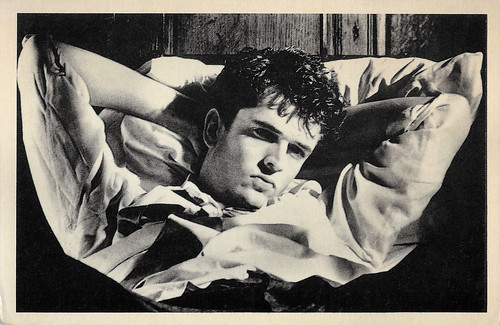
British postcard by World Postcards Inc., no. x50, 1988. Rupert Everett in Another Country (Marek Kanievska, 1984).
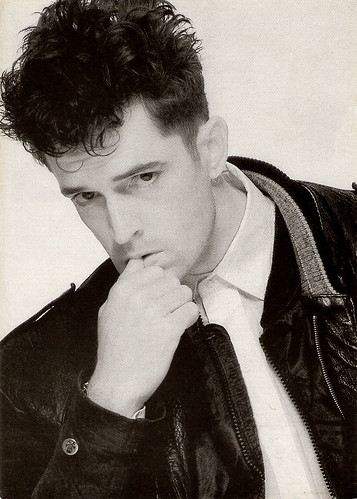
British postcard by Underground, no. U34.
The homosexual dandy and the fervent Marxist
Rupert James Hector Everett was born in Burnham Deepdale, Great Britain to Major Anthony Michael Everett and his wife Sara née Maclean. He has a brother, Simon Anthony Cunningham Everett. Everett was brought up as a Roman Catholic. From the age of seven, Everett was educated at Farleigh School, Hampshire, and from the age of thirteen was educated by Benedictine monks at Ampleforth College, Yorkshire. At this prestigious Roman Catholic public school, he trained classically on the piano.
He dropped out of school at 16 and ran away to London to become an actor. To support himself, he worked as a male prostitute for drugs and money. After being dismissed from the Central School of Speech and Drama (University of London) for clashing with his teachers, he travelled to Scotland and got a job at the avant-garde Citizens' Theatre in Glasgow.
Everett's break came in 1981 at the Greenwich Theatre and later West End production of 'Another Country', playing a gay schoolboy opposite Kenneth Branagh. His character, Guy Bennett, is based on the double agent Guy Burgess. The play was filmed, Another Country (Marek Kanievska, 1984) with Cary Elwes and Colin Firth. Brian J. Dillard at AllMovie: “Rupert Everett and Colin Firth give strong, economical performances as the homosexual dandy and the fervent Marxist who, for different reasons, chafe at the restrictions of their society. Both characters are callow and self-absorbed, but Firth's principled thinker and Everett's ambitious romantic undergo subtle transformations that make them ultimately sympathetic.”
He followed on with Dance With a Stranger (Mike Newell, 1985), based on the true story of Ruth Ellis (portrayed by Miranda Richardson), the last woman to be executed in England. In Italy, he starred in the Gabriel Garcia Marquez adaptation Cronaca di una morte annunciata/Chronicle of a Death Foretold (Francesco Ros, 1987) with Ornella Muti.
Everett began to develop a promising film career until he co-starred with Bob Dylan in the huge flop Hearts of Fire (Richard Marquand, 1987). Around the same time, Everett recorded and released an album of pop songs entitled 'Generation of Loneliness'. Despite being managed by the largely successful pop svengali Simon Napier-Bell who steered Wham! to international fame, the public didn't take to his change in direction. The shift was short-lived, and he would only return to pop indirectly by providing backing vocals for his friend Madonna on her 1999 cover of 'American Pie' and on the track 'They Can't Take That Away from Me' on Robbie Williams' 'Swing When You're Winning' in 2001. Following this flop, Everett disappeared for a while, taking up residence in Paris and writing a semi-autobiographical novel, 'Hello, Darling, Are You Working?'. He also came out as gay.
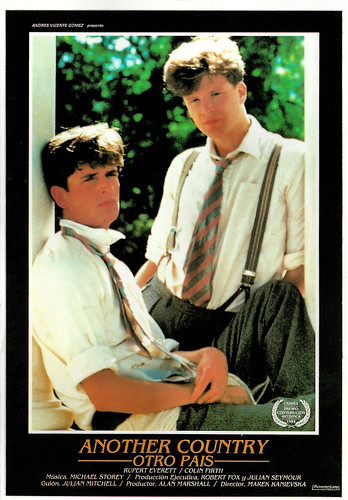
French postcard by Editions Mercuri, no. 634. Spanish poster for Another Country (Marek Kanievska, 1984).

Dutch collectors card in the "Filmsterren: een Portret" by Edito-Service S.A, 1995, no. D5 024-52-09. Photo: Delande / Stills. Rupert Everett in Another Country (Marek Kanievska, 1984).
Julia Roberts' gay confidant
Rupert Everett returned to the screen opposite Christopher Walken and Helen Mirren in The Comfort of Strangers (Paul Schrader, 1990). He was successful as the fat and lazy Prince of Wales (the later George IV) in The Madness of King George (Nicholas Hytner, 1994), and appeared among the all-star cast of Prêt-à-Porter (Robert Altman, 1994).
The Italian comic character Dylan Dog, created by Tiziano Sclavi, is graphically inspired by him. Everett appeared in a film adaptation, Dellamorte Dellamore/Cemetery Man (Michele Soavi, 1994) as a killer of zombies. In 1995 he released a second novel, 'The Hairdressers of St. Tropez'.
His film career was revitalised by his award-winning performance in the comedy My Best Friend's Wedding (P.J. Hogan, 1997), playing Julia Roberts's gay friend.
Robert Firsching at AllMovie: "Rupert Everett is terrific as Roberts' gay confidant, and there are some surprising scenes, including a woman with her tongue stuck to an ice sculpture in " most untoward location. It was a huge hit at the box office, with enough genuine romance to satisfy purists and enough bite for those with a slightly different attitude.”
Everett has since appeared in several high-profile film roles, including Christopher Marlowe in Shakespeare in Love (John Madden, 1998), Lord Arthur Goring in An Ideal Husband (Oliver Parker, 1999) and Oberon in A Midsummer Night's Dream (Michael Hoffman, 1999). In 1999, he also played Madonna's best friend in The Next Best Thing (John Schlesinger. 1999), and the villainous Sanford Scolex/Dr. Claw in Disney's Inspector Gadget (David Kellogg, 1999) with Matthew Broderick.
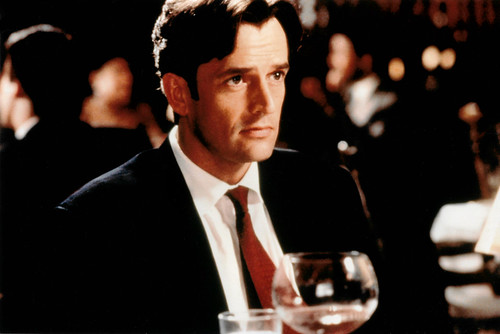
Vintage photo. Rupert Everett in My Best Friend's Wedding (P.J. Hogan, 1997).
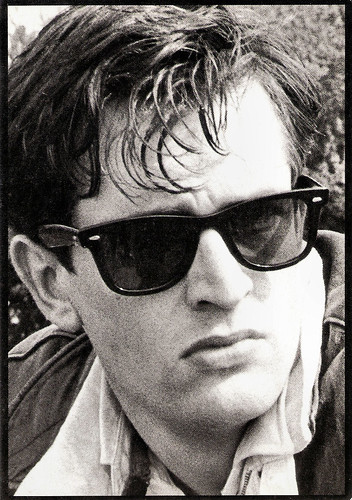
British postcard by Santoro Graphics, London, no. BW120. Photo: 20th Century Fox.
Royal portrayals
Rupert Everett became a Vanity Fair contributing editor and wrote a film screenplay on playwright Oscar Wilde's final years. He also appeared in another film adaptation of a Wilde play, The Importance of Being Earnest (Oliver Parker, 2002) with Colin Firth.
Later roles include his royal portrayals in To Kill a King (Mike Barker, 2003) and Stage Beauty (Richard Eyre, 2004), In 2006, he published a memoir, 'Red Carpets and Other Banana Skins', in which he revealed he had a six-year affair with British television presenter Paula Yates.
Since then, Everett led the 2007 Sydney Gay and Lesbian Mardi Gras, played a double role in the film St. Trinian's (Oliver Parker, Barnaby Thompson, 2007) and the sequel St. Trinian's 2: The Legend of Fritton's Gold (Oliver Parker, Barnaby Thompson, 2009), and has appeared several times on TV, causing regularly some outrage.
In recent years, Everett has returned to his acting roots appearing in several theatre productions. He made his Broadway debut in 2009 in the Noël Coward play 'Blithe Spirit', starring alongside Angela Lansbury.
During the summer of 2010, he played in a revival of 'Pygmalion' as Professor Henry Higgins at the Chichester Festival Theatre and reprised this role in 2011, at the Garrick Theatre in London's West End, starring alongside Diana Rigg as Higgins's mother and Kara Tointon as Eliza.

French postcard by Especially for you, Réf. 25.

British postcard by Statics, London, no. PC61.
Known for his aloof handsomeness and often smug, piss-elegant characters
Rupert Everett went on to play Oscar Wilde in 'The Judas Kiss' in 2013 and was about to play George on Broadway in 'Who's Afraid of Virginia Woolf?' when the play closed before it officially opened due to the COVID pandemic in 2020. On TV, he played the effortlessly suave Sherlock Holmes in Sherlock Holmes and the Case of the Silk Stocking (Simon Cellan Jones, 2004), the Marquis de Feron in the British series The Musketeers (2016) and Carroll Quinn in a second British series Adult Material (Dawn Shadforth, 2020).
Known for his aloof handsomeness and often smug, piss-elegant characters, he engagingly portrayed a jet-setter in the contemporary film People (Fabien Onteniente, 2004); and provided the voice of the unprincely Prince Charming in the animated features Shrek 2 (Andrew Adamson, Kelly Asbury, Conrad Vernon, 2004) and Shrek the Third (Chris Miller, Raman Hui, 2007).
He played a British defector opposite Sharon Stone in the romantic thriller A Different Loyalty (Marek Kanievska, 2004) and a millionaire playboy involved in a hit-and-run in Separate Lies (Julian Fellowes, 2005). He also has a part in the comedy film Wild Target (Jonathan Lynn, 2010), starring Bill Nighy, and the comedy Hysteria (Tanya Wexler, 2011) about the first vibrator.
He appeared as King George VI, father of Queen Elizabeth, opposite Emily Watson's Queen Mum in the romantic dramedy A Royal Night Out (Julian Jarrold, 2015). He also played a monsignor in Altamira (Hugh Hudson, 2016) opposite Antonio Banderas. He wrote and directed The Happy Prince (Rupert Everett, 2018), in which he also starred as tortured gay playwright Oscar Wilde during his last days. His co-star was Colin Firth, the co-star of his film debut, Another Country. He played Arthur Wellesley, Duke of Wellington in the historical epic Napoleon (Ridley Scott, 2023) starring Joaquin Phoenix.
Although Rupert Everett urged in 2009 gay stars not to 'come out' and to keep their sexuality a secret as it could end their film career’, he is a living testament disproving the theory that a truly talented and successful romantic leading man cannot survive the career-killing stigma of being openly gay. As of 2020, Everett lives with his partner Henrique, a Brazilian accountant.
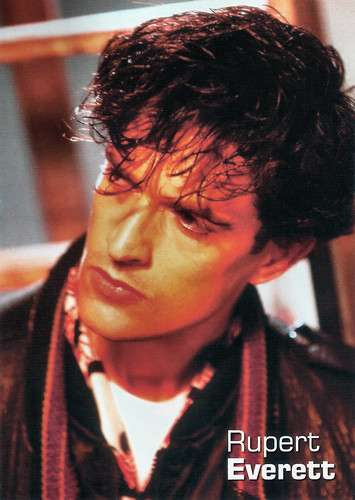
British postcard by Pyramid, Leicester, no. PC 8845, 1999.

Italian postcard by Piu.
Sources: Robert Firsching (AllMovie), Gary Brumburgh (IMDb), Wikipedia, and IMDb.
This post was last updated on 23 February 2024.
No comments:
Post a Comment